
In some form or another, sex is a natural behaviour for many people. After all, the topic of “the birds and the bees” is a fairly basic way to normalise, at its most fundamental level, the topic of sexual intimacy between people. Still, when you get into the specifics – the nitty-gritty, if you will – of sex, the topic (and the act) may lead to a certain level of anxiety and discomfort.
For some people, those anxieties or fears can be just as “normal” as feeling comfortable and relaxed about the notion of sex. For a more personal look at some of the most common sex fears, we surveyed over 1,000 people, including Britons and Americans, about what makes them uneasy in the bedroom and how they communicate with their partner(s) about their most intimate anxieties. Read on as we explore their responses.
Admitting Concerns
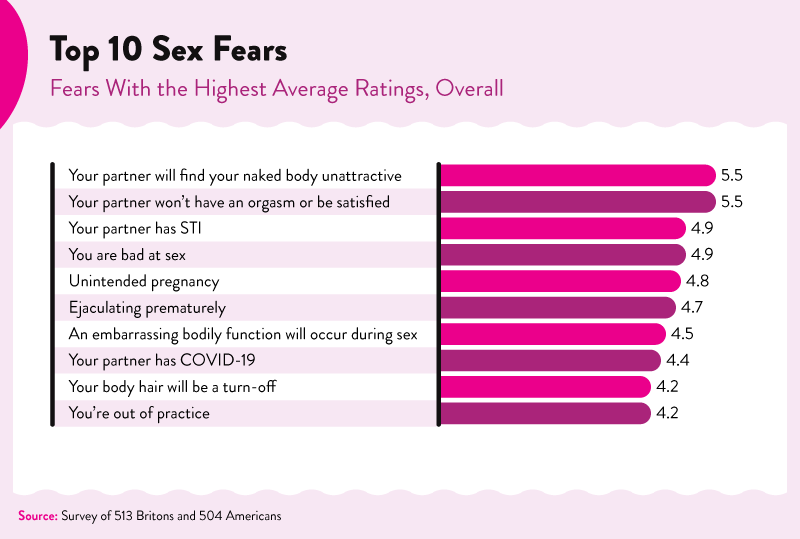
To start, we asked our respondents (who identified as men, women, and nonbinary individuals) to rank their most common sexual anxieties on a scale of 1 to 10, with 10 being the most significant fear. The most common fear among Brits and Americans was that their partner would find their naked body unattractive, earning an average score of 5.5 out of 10. Tied with this concern, people surveyed also cited not being able to sexually satisfy their partner (also a 5.5 out of 10) as a familiar fear. Overwhelmingly, having a poor body image or low self-esteem doesn’t just mess with your head, it can lead to diminished sexual satisfaction.
Also tied as a common bedroom concern for both Brits and Americans were two very different scenarios: being bad at sex and a partner having an STI (4.9 out of 10 each). Regardless of how well you might know someone before you sleep with them, and especially if you don’t, it’s important to be aware of the prevalence of STIs and ways to mitigate or avoid sharing diseases while being intimate.
While slightly less common, an unintended pregnancy (4.8), premature ejaculation for men (4.7), and an embarrassing bodily function occuring during sex (4.5) were also rated as relatively natural fears people experienced during sex.
Sexual Anxieties Among Britons and Americans
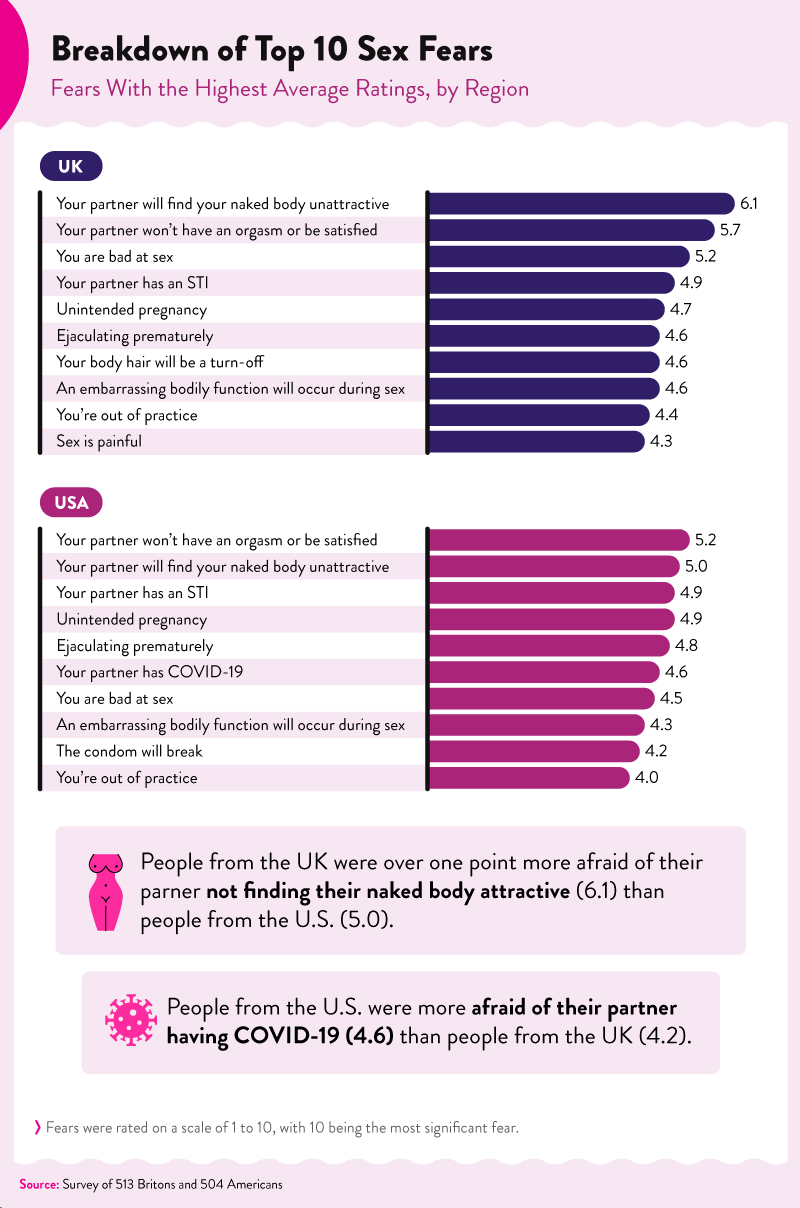
The mechanics of sex, the nuts and bolts of it all, may not change much depending on what side of the pond you’re on, but your fears and anxieties might.
Compared to Americans, the fear that their partner would find their naked body unattractive was higher among Britons (6.1) versus those surveyed in the U.S. (5.0). And while Americans rated their highest concern that a partner wouldn’t climax or be satisfied after sex (5.2), Brits gave the same worry a higher overall rating (5.7). Except for fear of unintended pregnancy or premature ejaculation, those surveyed from the UK were generally more concerned than U.S. respondents about nearly every sex fear queried.
Another fear that was more of a concern for Americans than Britons was COVID-19. People from the U.S. were more afraid of their sexual partners having COVID-19 (4.6) than people from the UK (4.2).
Relationship Status and Sexual Frustrations
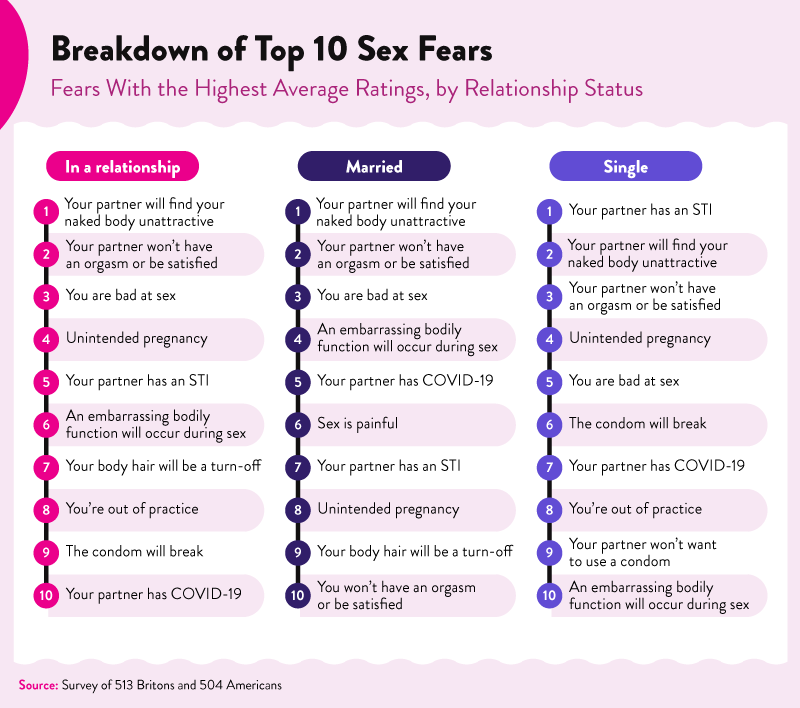
Even though sex has been linked to having a measurable, positive impact on both physical health and mental well-being, it’s easy for life to sometimes get in the way of making time for bedroom activities. Couples in the UK are having less and less frequent sex, reportedly because they’re too busy watching Netflix or perusing social media.
As we found, both couples dating and married shared the same concerns where sex was concerned: being found unattractive while naked and worrying they wouldn’t be able to satisfy their partners. While married couples among both Brits and Americans were typically less concerned about becoming pregnant unintentionally, couples were also worried they would be bad at sex. Like it or not, sex has a certain use-it-or-lose-it quality. The less sex you have, the more difficult it can become to be stimulated (in addition to erectile dysfunction and higher rates of stress).
While singles weren’t immune to some of these more self-conscious concerns, they were more worried about one thing in particular: STIs. Having sex with more than one partner makes testing for sexually transmitted infections even more important.Thankfully, at-home STI test kits make it both easy and private to regularly check for sexually transmitted diseases ranging from chlamydia and gonorrhoea to HIV or HPV.
One would think that singles and those who are in a relationship would be the most concerned about contracting COVID-19 from a partner, especially one that is more casual than no, due to their increased likelihood of being exposed to it. Interestingly enough though, married couples were more concerned than singles and those who were dating about their partner having COVID-19. Maybe it’s because they are more likely than those in less serious relationships to be stuck in the same household as their partner, increasing their own risk of catching the virus.
Leading Bedroom Concerns
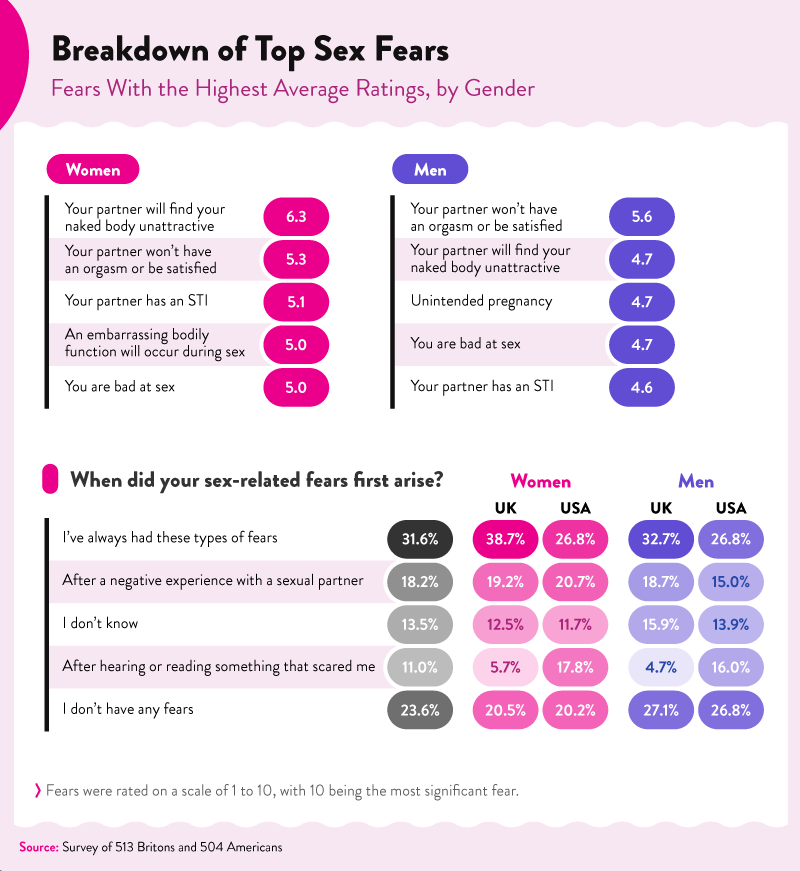
Men indicated their top fear was being unable to make their partner orgasm or satisfied with sex (5.6 out of 10). In contrast, women were less concerned about making their partners climax (5.3) and instead ranked a partner finding them unattractive while naked as their top fear (6.3). Women also indicated being more worried about their partner having an STI (5.1) than men were (4.6), though less worried, on average, about an unintended pregnancy. Compared to men (4.7), women were also more afraid of being bad at sex (5.0).
When asked how long they’ve had these concerns, nearly 1 in 3 people admitted they’d always had the fears they described to us, and close to 1 in 5 described having had a negative experience with a sexual partner. While nearly 24% of people didn’t have any fears, 1 in 10 said their fears around sex were triggered after something they heard or read made them anxious.
People in the UK, including 39% of women and 33% of men, were more likely than those in the U.S. to have always had these internalized sexual fears. Across both regions, men were seven percentage points more likely to indicate not having any sexual fears compared to women. Compared to roughly 5% of Britons, 18% of American women and 16% of American men indicated their sexual fear first arose based on something they heard or read.
Finding Common Ground
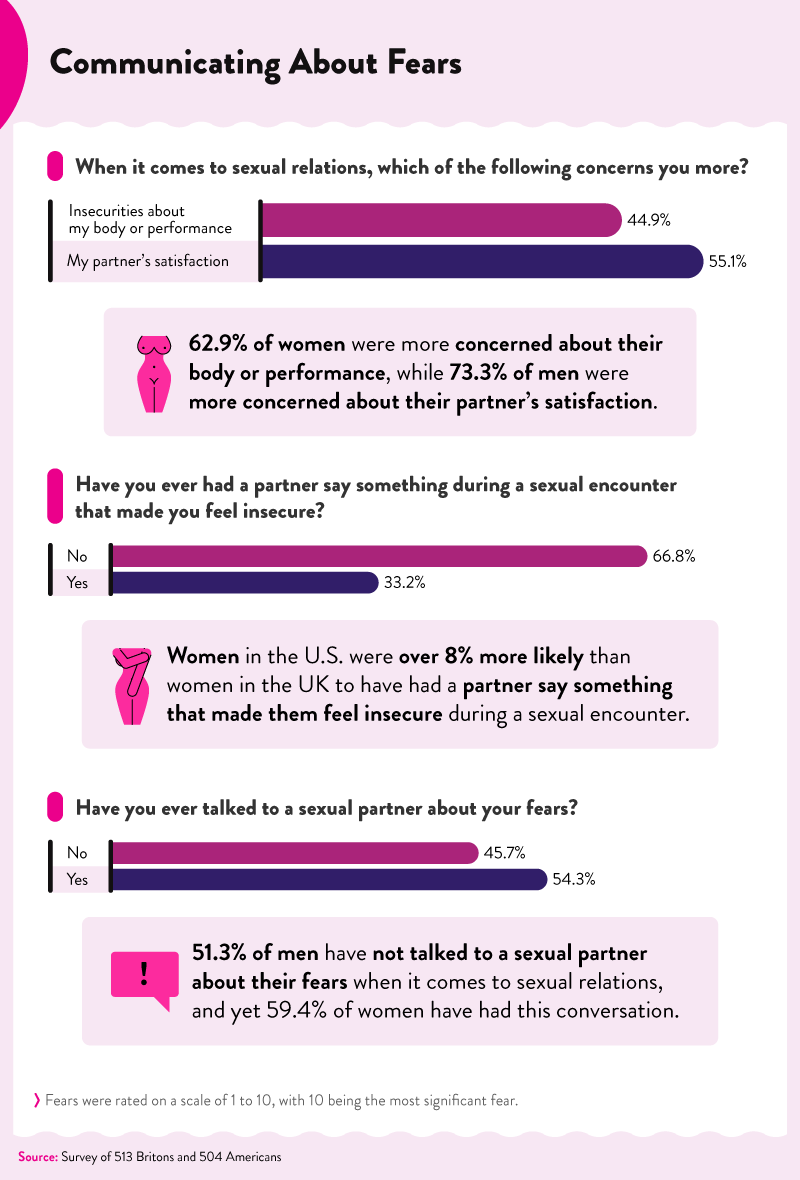
While their own attractiveness was a common concern among both men and women, 55% of people polled acknowledged they were more worried about their partner’s satisfaction than about their own body insecurities (45%). However, when looked at through the lens of gender, our data shows a different perspective for women. Unlike the majority of men, who were more concerned about their partner’s satisfaction (73.3%), the majority of women were most worried about their body or performance (62.9%).
Despite these fears, 67% of people also indicated they’d never had a partner say anything during a sexual encounter that made them feel insecure. Among those whose partners had said something that made them feel uncomfortable, women in the U.S. were 8% more likely to have these kinds of encounters than women in the UK. And though many of the fears we asked both men and women about were relatively common, just 54% of people reported having talked to their partners about their sexual fears, while 46% kept those anxieties to themselves. Women (59%) were more likely than men (51.3%) to discuss their sexual fears with their partners.
Making Space to Discuss Sexual Fears
With the right partner and under the right circumstances, sex is meant to be a positive experience for everyone involved. And though the end goal may be mutual pleasure, many people share the same sexual fears about their body, their performance, and their ability to stay safe with the people with whom they’re intimate.
At Superdrug Online Doctor, we’re passionate about making your passion safe and easy. With access to our online doctors, we’ve got all of your sex health needs covered. From contraceptives and STI treatments to erectile dysfunction treatment, we’ll help you find your preferred medication and have them delivered right to your door. Once you’ve placed your first order, having your medication refilled is even easier. Visit us online today to learn more.
Methodology and Limitations
Using Clickworker and the Amazon Mechanical Turk service, we polled a total of 1,017 respondents. We had 513 UK respondents and 504 U.S. respondents. The average age among our respondents was 35.50 with a standard deviation of 10.99.
Generational breakdown was as follows:
- Baby boomers and older: 74
- Generation X: 255
- Millennials: 588
- Generation Z: 100
There were a total of 510 women, 501 men, and 6 people who identified as nonbinary. While we did have nonbinary respondents, it wasn’t enough to statistically include them in asset breakdowns surrounding gender.
Respondents were given a preset list of fears and asked to rate them on a scale of 1 to 10, with 1 being not afraid at all and 10 being very afraid.
This survey has not been weighted. This study relies on self-reported data, therefore it may contain exaggeration or underreporting of data by respondents.
Fair Use Statement
Want to start a conversation about positive sexual health? Share the results of this study for any noncommercial use with the inclusion of a link back to this page in your story as credit to our creative contributors for their work.